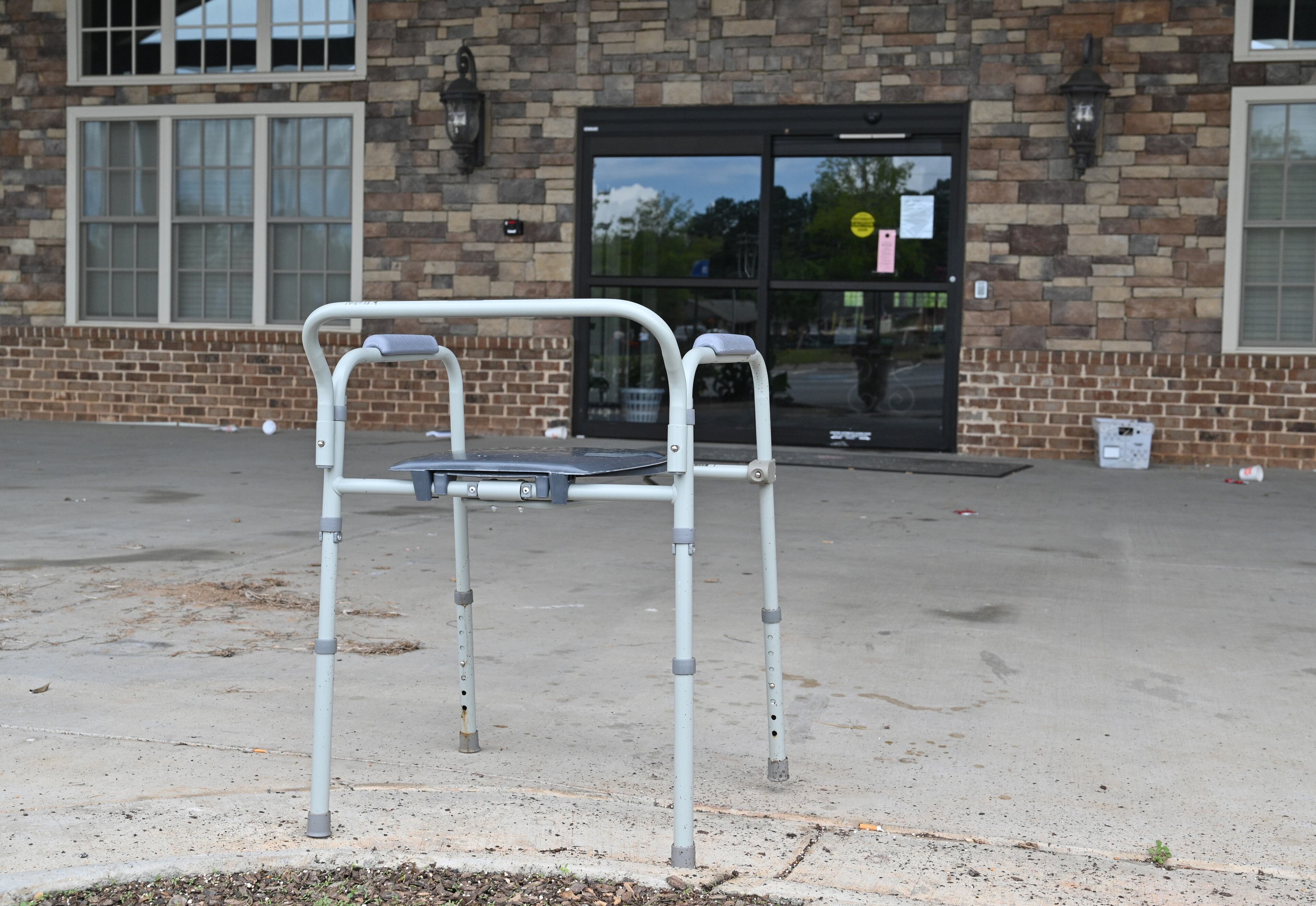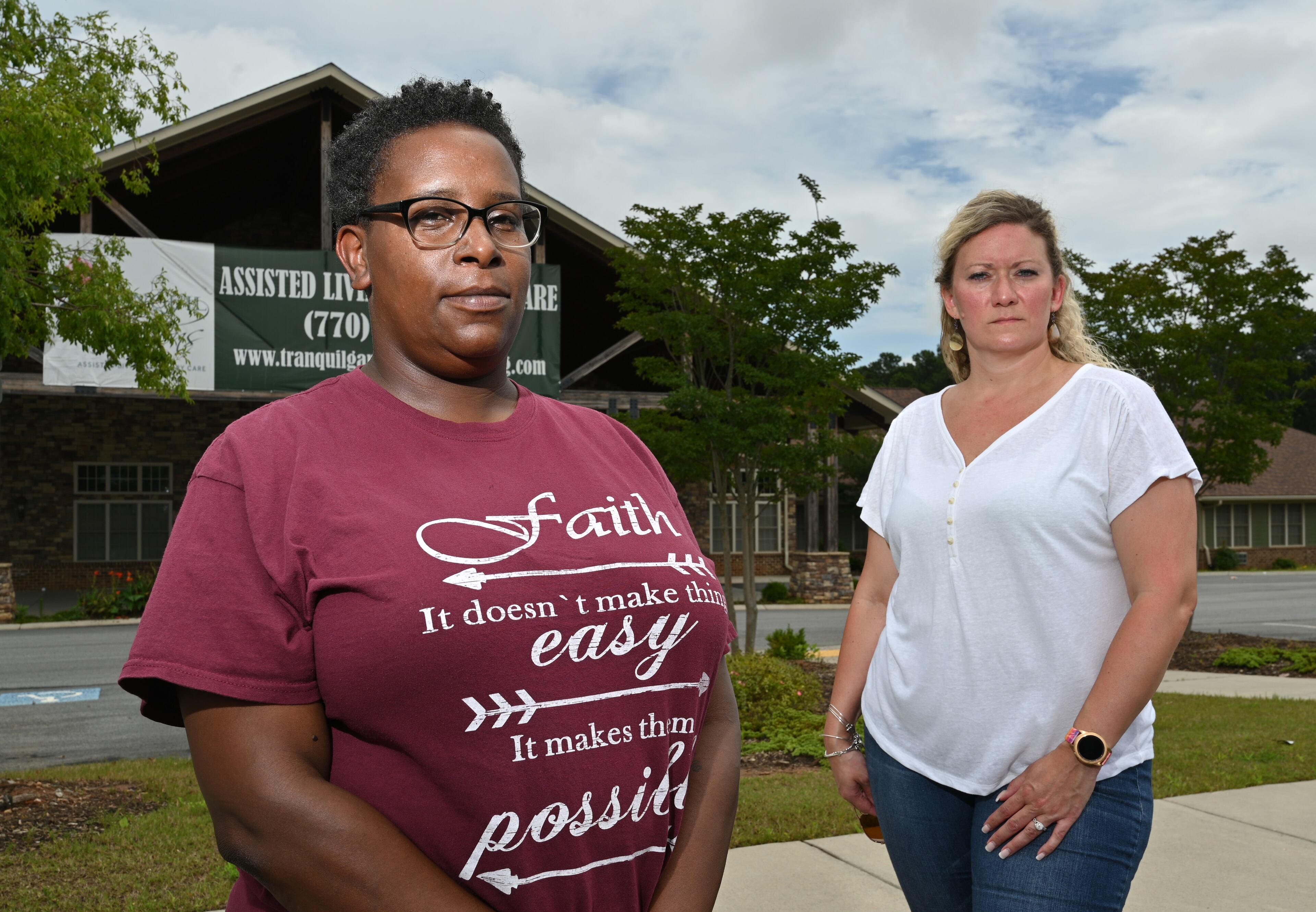Senior care home hid financial woes from residents, then abruptly ordered them out

As the coronavirus raged in Georgia, the state insisted that senior care homes restrict visitors to protect their vulnerable residents from infection.
That didn’t stop Tranquil Gardens Assisted Living & Memory Care in Acworth earlier this year from erecting a large sign out front. It read: “Celebrating 2 year Anniversary! Come and visit us! We are 100% open!”
Tranquil’s then-executive director Nikki Windsor saw the sign and objected. It wasn’t true, she told Brian Stewart, whose family owned the business. Opening the facility to visitors would violate state regulations.
His reply, according to Windsor: “I don’t care. I want my doors open.”
That sign was one of many attempts by the home’s leadership to mask a spiraling financial crisis, an Atlanta Journal-Constitution examination found. Almost from the time the first residents moved in late in 2018, Tranquil Gardens was scrambling to stay afloat. A few months later, the owner of the facility filed for bankruptcy. But the owner and the home’s operator hid this reality from the elderly residents and prospective ones. Staff kept mum, too, even as bills went unpaid and beds unfilled.

Residents paid the price. On July 13, Stewart gave residents three days to get out. The facility was closing, he told employees and others, and the electricity was being shut off. The bank, he claimed, had foreclosed.
That set off a horrific scene, where residents and staff were crying, state records show. Meals stopped being prepared, and food was short. Families desperately scrambled to move out loved ones, with some saying they had to leave behind belongings they couldn’t move and records they couldn’t obtain. Residents also left without refunds, and their caregivers without pay.
“They never once let anybody know to be prepared, to get prepared,” said Joy Beth Fissette, whose parents both have dementia and had been living at the home the past year. “The owners, they knew, they knew this whole time. It’s so frustrating that they knew about this whole thing.”
How and if any real accountability will arrive for those responsible for what happened at Tranquil Gardens remain open questions.
The Cherokee County Sheriff’s Office is investigating if criminal laws were violated, and state officials this past week cited the home for violating a rule requiring a 30-day notice before an assisted living resident can be discharged or evicted. But with the facility’s owner in bankruptcy, its unclear whether the state can collect any fines it might impose.
A written statement released on behalf of the Stewart family attributes the shutdown to the pandemic. “While we have worked tirelessly to try and remedy the situation and explored every possible avenue, a domino effect of things out of our control transpired at the end that led to a very heartbreaking and rapid end to the facility,” the statement says.
Brian Stewart, who had previously been in the tree service business, declined an interview request for this story. He said businesses close all the time.
“This whole thing was a bad business,” he said. “It’s unfortunate it’s an assisted living. We couldn’t make it work.”
The family apparently has been reluctant to answer state regulator’s questions, also, records show. When the Department of Community Health asked Stewart whether residents had been reimbursed for the remainder of their July rent, he wouldn’t answer. He told them all further questions would have to go through his attorney.

Reform law came too late
Up to now, consumers have had no clear way to assess a care home’s financial health. That’s because the state hasn’t tracked the information, and there were no requirements for disclosure by the homes.
But after an AJC investigation in 2019 found that more than 20% of Georgia’s assisted living communities and large personal care homes had owners or operators with financial problems, state lawmakers took action. Last year, they approved a new law requiring senior care home operators to prove before they open that they have money to operate, and to give regulators, residents and their families 60-day notice of any impending bankruptcy or property eviction that may force residents to relocate.
“This whole thing was a bad business. It's unfortunate it's an assisted living. We couldn't make it work."
With the pandemic compounding the financial problems of many senior care facilities, that law is now seen as vital. It was to take effect July 1.
But state regulators are still promulgating the specific rules for how the law is administered, and it all came too late for those at Tranquil Gardens.
Now, the Acworth home may be a test as to whether the law has the teeth to be effective.
“I think it’s certainly something we should look at,” said Rep. Sharon Cooper, R-Marietta, who sponsored the reforms. “I’m often bewildered at how human beings can treat other humans in such horrible ways.”

Nearly $10 million in debts
Stewart’s mother, Janice, the matriarch of a family that has roots in Cherokee County that go back decades, owned the land near Acworth where Tranquil Gardens was built through Five Dreams Holding LLC. The property used to be a mobile home park.
The assisted living project started in 2015 but took three and a half years to complete, plagued by delays, contractor disputes and cost overruns, according to court documents. It finally opened in December 2018, deeply in debt to Morris Bank with loans and lines of credit totaling nearly $10 million.
Making the business a success depended on attracting residents. But it struggled to fill beds, and in late spring 2019 the crushing debt forced the holding company into bankruptcy. Tranquil Gardens had only 12 residents at the time; it was licensed for 78 beds. Last year during the pandemic, the home told the state it had around 30 residents each month.

Windsor, who had become executive director in February 2019, said she slowly learned about the financial troubles, as a utility company threatened to cut off power and internet service periodically was lost because bills weren’t paid. She said she didn’t know about the bankruptcy until months after it was filed.
Instead of telling residents of the financial challenges, she said she tried to shield them because she didn’t want them to worry. Windsor now regrets the decision. “I feel like everything I did to protect those residents and prevent them from knowing backfired,” she told the AJC.
Finally, Windsor said, the stress of trying to hold things together took a toll. In mid-May, she said Brian Stewart told her the home needed more revenue, ordering her to increase monthly rents by $500, starting June 1.
She said that couldn’t happen because residents’ contracts required a 60-day notice and state rules required 30 days. She said she convinced him to push the rent increase to July 1, but letters about the increase started going out to residents in May and some gave notice they would leave.
Windsor quit a couple weeks later. “We were in our final hour,” she said.

Tiffany Echols, who had worked at the home for a couple years, became its executive director after Windsor stepped down. She said for much of her time there the facility didn’t have a marketing director, an activities director or a maintenance man.
“They just thought they would open their doors and people would come in,” she said. “Things you needed to run a business, they didn’t have it. It was the strangest thing I’ve ever been a part of.”
She was the one in charge when Brian Stewart on July 13 ordered everyone out. Employees were turned out, too. They didn’t get their final three weeks of pay.
While Stewart said foreclosure was forcing the facility to close, officials of Morris Bank, which loaned the family’s holding company the money to build Tranquil Gardens, said the bank was caught off guard by Stewart’s action.
“We did not initiate foreclosure,” said Spence Mullis, president and CEO.
A scene of chaos and sadness
Fissette said she was out of town when the facility announced its pending closure, which set off a harrowing scramble to find a new assisted living home for her parents, pack their belongings into her pickup truck and get them moved.
Facing a noon deadline on July 16 to clear out, Fissette said she couldn’t get all her parents’ possessions out. Left behind, she said, were two beds, a recliner, a couch and many of her mother’s shoes.
Worse, she worries the sudden change and upheaval will cause stress that could hasten their decline, a common worry for Alzheimer’s and dementia patients.

The final day at the home, she said she saw Stewart in the lobby area and confronted him. “I hope you go to jail,” she said she told him.
She said he replied: “I have to take care of my family.”
State Rep. John LaHood, R-Valdosta, who helped spearhead the assisted living reform law, said he is troubled by what happened to the residents. LaHood, who owns and operates five senior care homes in South Georgia, said he would be working with other lawmakers to review the rules and, if necessary, tighten them to ensure this doesn’t happen again.
“It’s situations like these that give our industry a bad name,” he said. “The typical resident in an assisted living community is there because they are unable to live independently. Giving them three days to vacate is ridiculous.”
A band of residents and their families has engaged with an attorney, who said he expects to file a lawsuit as early as next week alleging negligence, breach of contract and wrongful eviction.
Tranquil Gardens is the second senior care home to close in recent weeks. In June, a care home for seniors was shut down after residents were found suffering in rooms without air-conditioning. Investigations by The Atlanta Journal-Constitution have detailed how weak oversight of senior care facilities has resulted in deaths and injuries to the vulnerable elderly. For this story, the AJC talked with former employees of Tranquil Gardens, family members of residents, state regulators and the home’s lender. The newspaper also reviewed bankruptcy files and other court records.
“It is unconscionable that these owners would violate their contractual and regulatory duties to harm their own residents and their families,” said Edmund Novotny, the attorney representing the group.
This past Wednesday, as the bankruptcy court gave the bank the OK to foreclose, the scene at Tranquil Gardens was grim.
An abandoned dresser and shower chair stood in the driveway. Cigarette butts and empty coffee cups littered the ground. A pink notice from the local water authority was posted on the building, saying service had been disconnected because of a delinquent bill.
The inside of the building was dark, but daylight from outside made a Bible passage on the lobby wall visible: “Rise in the presence of the aged,” the passage from Leviticus read. “Show respect for the elderly, and revere your God.”

Our reporting
Tranquil Gardens is the second senior care home to close in recent weeks. In June, a personal care home for seniors was shut down after residents were found suffering in rooms without air-conditioning. Investigations by The Atlanta Journal-Constitution have detailed how weak oversight of senior care facilities has resulted in deaths and injuries to the vulnerable elderly. For this story, the AJC talked with former employees of Tranquil Gardens, family members of residents, state regulators and the home’s lender. The newspaper also reviewed bankruptcy files and other court records.


